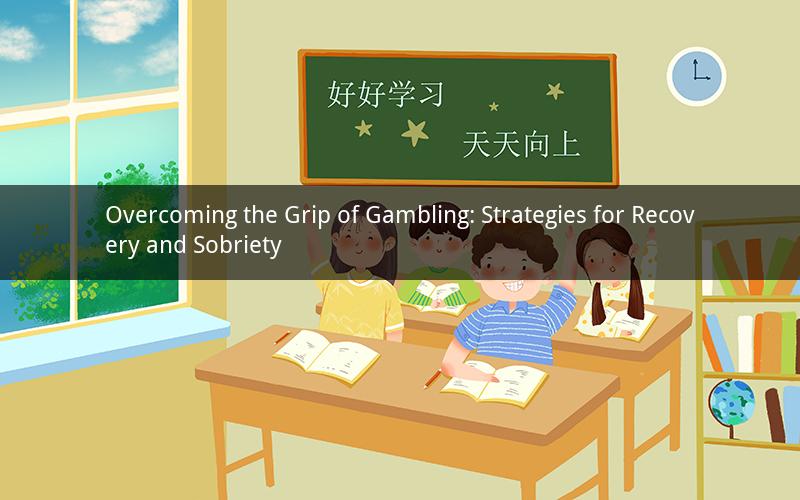
Introduction:
Gambling can become an insidious addiction, leading individuals into a spiraling cycle of financial, emotional, and social problems. The path to recovery is often fraught with challenges, but with the right approach, it is possible to overcome this destructive habit. This article delves into various strategies for dealing with a gambling problem, including recognizing the signs, seeking professional help, and rebuilding one's life.
1. Identifying the Problem:
The first step in dealing with a gambling problem is acknowledging that there is an issue. Common signs of a gambling addiction include:
- Lying to friends and family about gambling activities
- Borrowing money to finance gambling habits
- Missing work or social events due to gambling
- Neglecting responsibilities in favor of gambling
- Feeling a sense of shame or guilt about gambling behavior
It is crucial to be honest with oneself and others about the extent of the problem to begin the journey toward recovery.
2. Seeking Professional Help:
A gambling addiction can be complex and deeply ingrained, making it challenging to overcome on one's own. Professional help can provide the support and tools needed to break the cycle of addiction. Here are some options to consider:
- Therapists specializing in gambling addiction can offer personalized treatment plans
- Support groups, such as Gamblers Anonymous, provide a community of individuals facing similar challenges
- Inpatient or outpatient rehabilitation programs can offer comprehensive care and support
Professional help can help individuals understand the underlying causes of their gambling addiction and develop coping strategies to avoid relapse.
3. Financial Recovery:
One of the most immediate consequences of a gambling addiction is financial turmoil. To address this aspect of the problem, consider the following steps:
- Create a budget to manage your income and expenses
- Set aside funds for essential needs, such as rent, utilities, and groceries
- Consider seeking financial counseling to help you regain control of your finances
- Pay off any outstanding debts as quickly as possible to reduce stress and anxiety
Addressing financial issues can help alleviate some of the pressure that may contribute to relapse.
4. Developing Healthy Habits:
Gambling addiction often leads to neglect of one's physical, mental, and emotional well-being. By incorporating healthy habits into your daily routine, you can strengthen your resolve to overcome the addiction. Here are some suggestions:
- Exercise regularly to boost your mood and improve overall health
- Maintain a balanced diet to provide your body with the necessary nutrients
- Practice relaxation techniques, such as meditation or deep-breathing exercises, to manage stress
- Engage in hobbies or activities that do not involve gambling, such as reading, cooking, or gardening
Developing a well-rounded lifestyle can help keep your mind occupied and reduce the temptation to gamble.
5. Rebuilding Relationships:
Gambling addiction can strain relationships with friends, family, and loved ones. To mend these connections, consider the following steps:
- Communicate openly and honestly about your struggles and progress
- Apologize for any harm caused by your gambling behavior
- Spend quality time with loved ones to strengthen your bonds
- Seek support from friends and family as you navigate the recovery process
Rebuilding relationships can provide you with additional motivation to stay on track with your recovery journey.
6. Continuing Education:
Education is a vital component of long-term recovery. Here are some resources to consider:
- Online forums and communities for individuals dealing with gambling addiction
- Workshops and seminars on responsible gambling and addiction recovery
- Books and articles on the science of addiction and strategies for overcoming it
Continuing to educate yourself about gambling addiction can help you stay informed and motivated throughout your recovery journey.
Conclusion:
Overcoming a gambling problem is a challenging but rewarding process. By recognizing the signs of addiction, seeking professional help, addressing financial issues, developing healthy habits, rebuilding relationships, and continuing education, individuals can take control of their lives and move forward with confidence. Remember, recovery is a journey, and with dedication and perseverance, it is possible to break free from the grip of gambling addiction.
Questions and Answers:
1. Q: How can I tell if I have a gambling problem?
A: Look for signs such as lying about gambling, borrowing money to gamble, neglecting responsibilities, feeling shame or guilt, and missing work or social events due to gambling.
2. Q: What should I do if I realize I have a gambling problem?
A: Acknowledge the issue, seek professional help, create a budget, develop healthy habits, and rebuild relationships with loved ones.
3. Q: Are there support groups available for individuals with gambling addiction?
A: Yes, Gamblers Anonymous is a well-known support group that offers meetings and resources for individuals dealing with gambling addiction.
4. Q: How can I manage my finances during recovery?
A: Create a budget, prioritize essential expenses, seek financial counseling, and pay off debts as quickly as possible.
5. Q: Is it possible to overcome a gambling addiction?
A: Yes, it is possible to overcome a gambling addiction with dedication, professional help, and a strong support system. Recovery is a journey, and it's important to stay committed to the process.